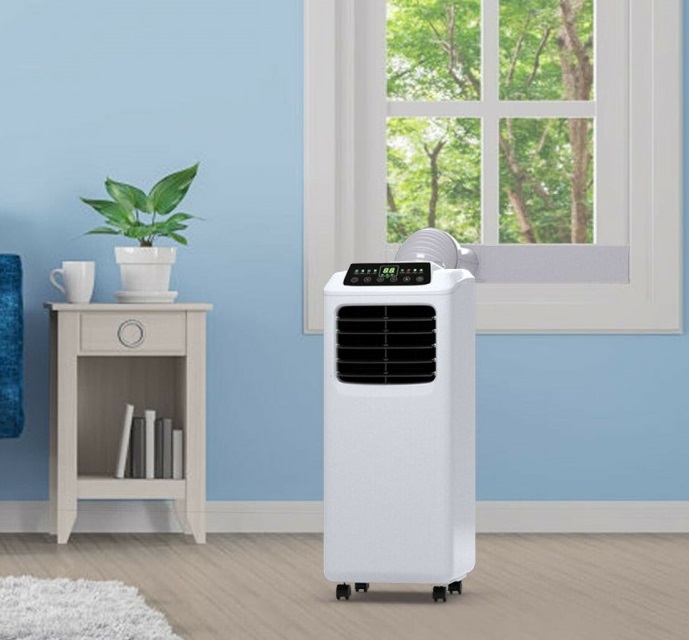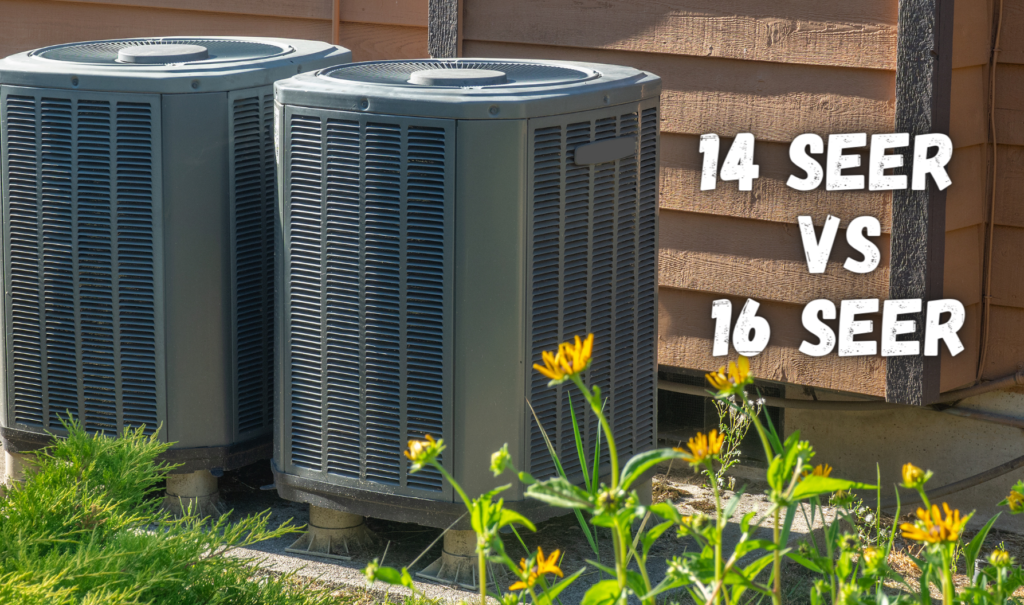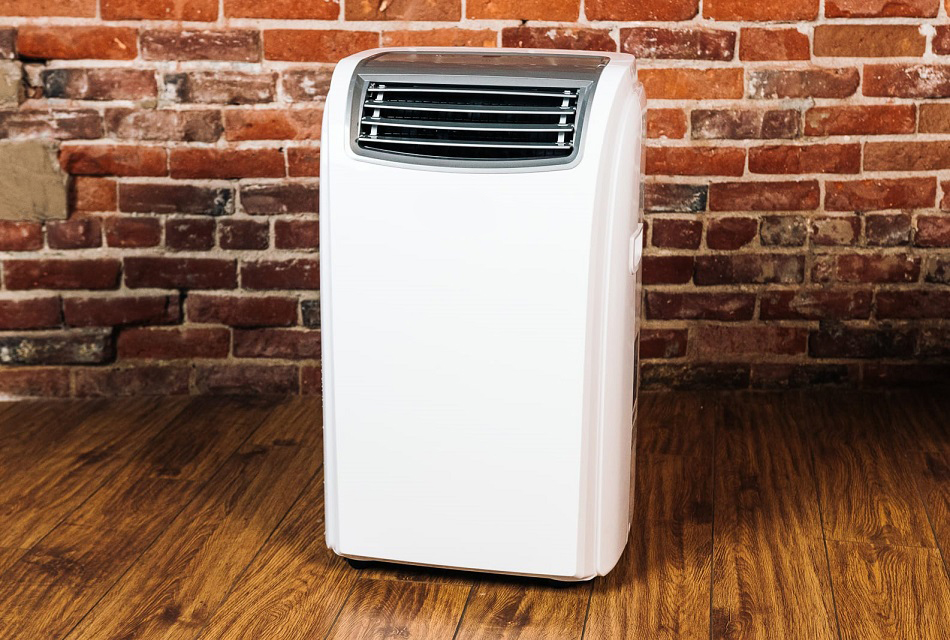

Heat. Humidity. Two conditions that cause an unpleasant feeling. While we used to suffer all summer-long, desperately waiting for a breeze to waft through the house, thanks to technology we now have the option of installing an air conditioning unit. However, there are many types of air conditioners and it can be hard to figure out which one is best. Have no fear as we have put together a comprehensive list of all the different types of AC units. We’ll walk you through what to expect from a window unit versus a portable unit and even explain what a central air conditioning unit is. By the end you should have enough knowledge to maintain a cool, comfortable home.
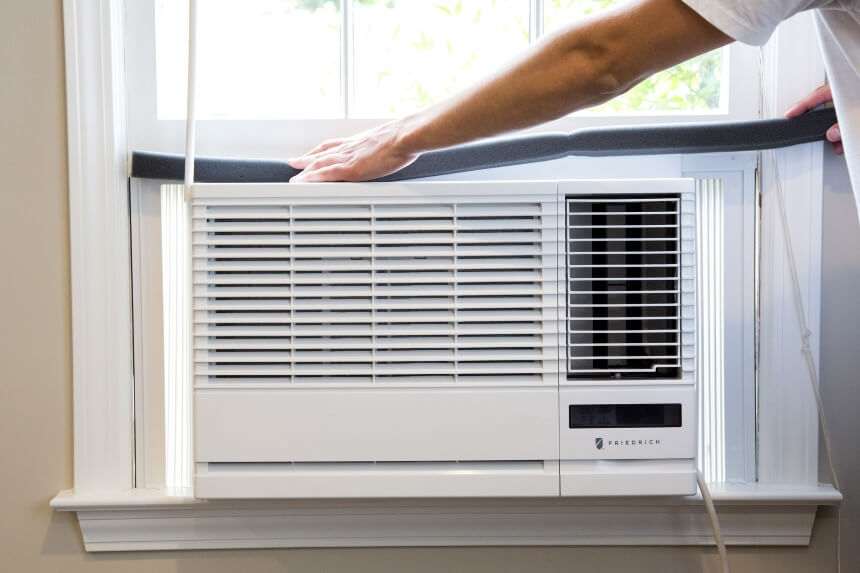
Window AC units are able to cool a large room, so they are perfect for apartment living. They can cool your bedroom or living room and ensure the air is cool as it blows the hot air outside.
Because smaller spaces don’t have a lot of floor area, placing an AC unit in the window frees up the area so you don’t have to worry about moving furniture.
Finally, these AC units are quite efficient and don’t cost a lot of money to run. They are also easy to maintain.
The problem with any type of window air conditioner is that they are quite visible. Sometimes it’s nice to be able to open a window in the summer and if you don’t have many windows in your apartment, having an AC unit means less natural sunlight and a not so nice view.
Furthermore, older window AC units can be rather noisy. While there are quiet models available, they do cost more.
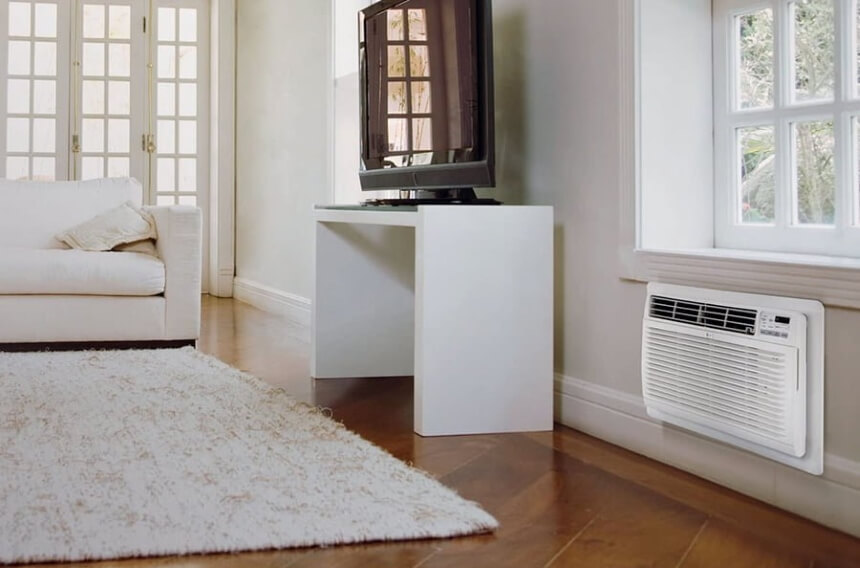
Through-the-wall AC units, such as this model from Koldfront, are installed right into your wall. You still get the convenience of a cool room without having to sacrifice your window. Furthermore, they work well without needing any ductwork so they aren’t as hard to install as you may think.
While you can certainly try to install a through-the-wall air conditioner on your own, it is recommended that you have an expert do it. You need to cut through a wall in your home and it’s imperative that there are no wires or pipes that you cut into. Another consideration is that the unit has to fit properly with insulation so there are no drafts in the wintertime.
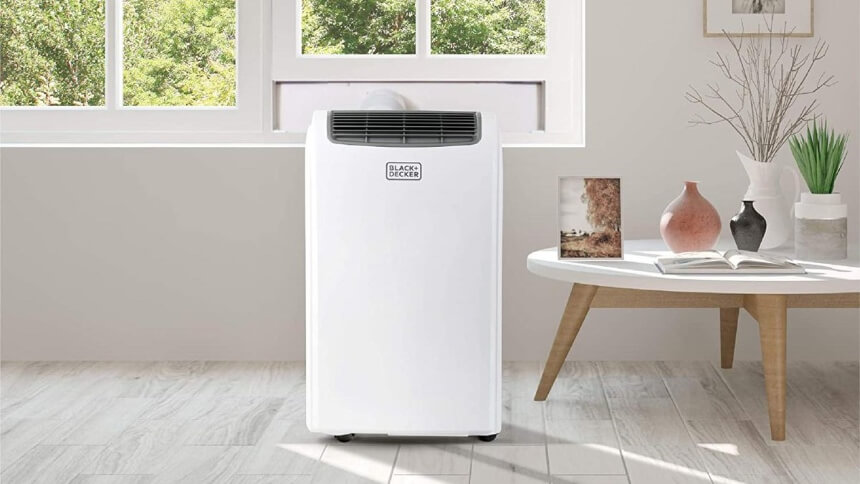
The best part of a portable AC unit is, surely, that it is portable. Not only can you set it up only when you need to, but you can move it around the house as needed, too. If you spend most of the day downstairs, then there’s no need to keep the upstairs of your home cool. Then, at bedtime, simply move your AC unit upstairs. You save on money by having just one unit, as well as with less electrical costs.
For a portable AC unit to work, you need access to an electrical outlet and a window. While this is usually an easy combination to find, it may limit the available places it can be.
As well, a portable AC unit might not be able to cool a large room. With this type of air conditioning unit, it’s especially important to pay attention to its specifications.
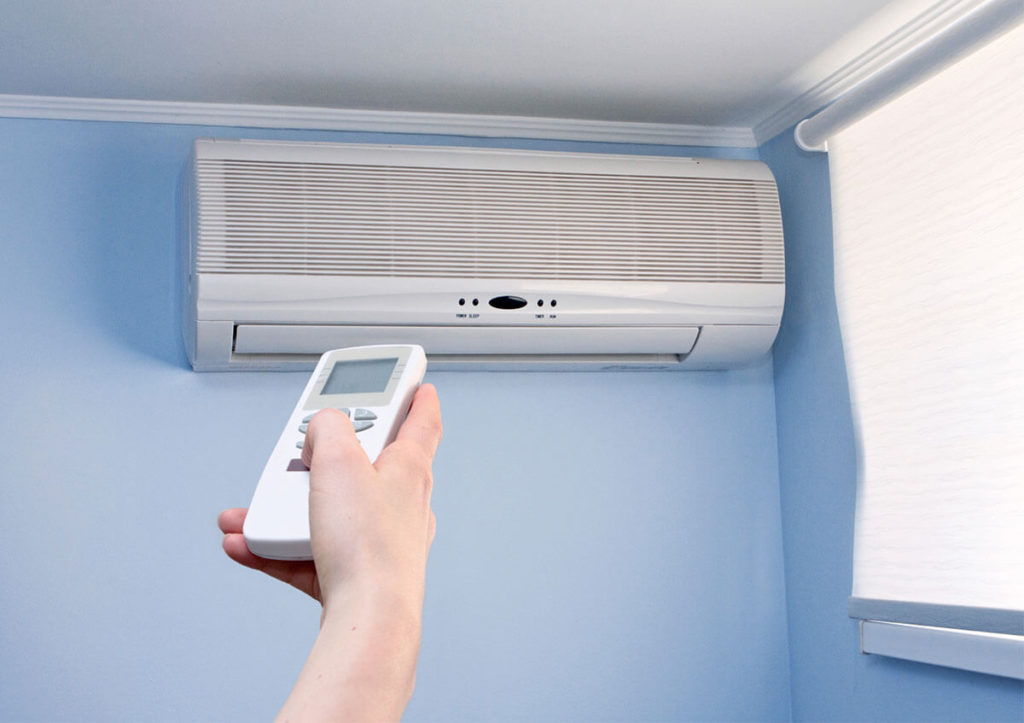
Split air conditioners are easy to install. As their name suggests, they are ductless, so you don’t have to worry about installing separate ducts behind the walls of your home. In fact, you can easily attach a split air conditioner to a wall.
Each split air conditioner is large and powerful enough to service a room. Therefore, you can control which areas of the room are cooled. This is really beneficial as in most cases, it is just the upstairs bedrooms that become too warm to sleep in at night. Furthermore, even if you have multiple split air conditioners, each can be controlled individually.
While split air conditioners are easy to install, they can cause a lot of damage to your wall. You will need some solid hardware to keep them attached to the wall, and if you decide to remove them, there will be large holes that need to be filled in.
Another drawback is that they can be quite large and therefore very visible. You can’t simply move the device when you no longer need it, so even in cold winter months, you will have an air conditioning unit taking up a lot of space on your wall.
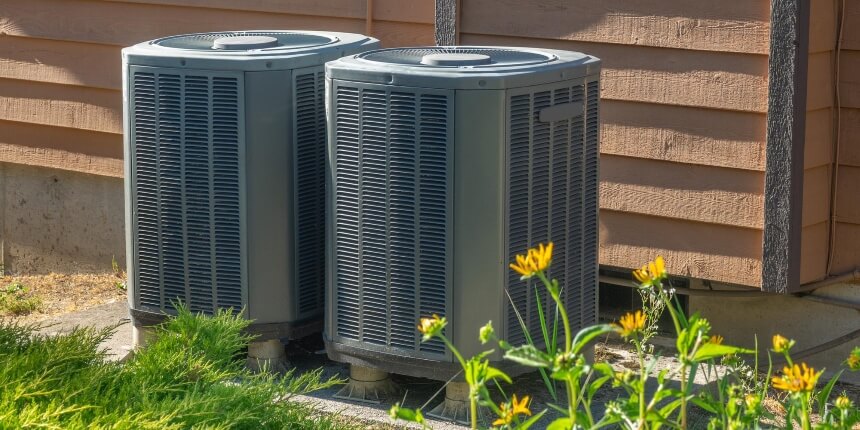
Central air conditioning has a lot of benefits if you live in a large home and it is hot for most of the year. The cool air will circulate throughout each room, allowing you to be comfortable in all areas. The temperature is also regulated so you don’t have to worry about constantly adjusting the controls.
Furthermore, you can now pair most central air conditioning units with smart thermostats, allowing you to set different temperatures throughout the day, depending on if you are home or not.
While there are different types of central air conditioners, they all share the same feature in that they are expensive. If you are installing a central air system in your house, it will cost a lot. And once it is installed, your electric bill will heavily increase.
Furthermore, the compressor can often have issues, so you will need to service it and perform annual maintenance. This is both a headache and an extra expense.
After understanding what are the different types of air conditioners, the next step is deciding which is right for your home. The following features should all be considered.
Above all else, think about what space in your home needs to be cooled. If your entire home needs to be cooled at the same time, then a central air conditioning unit should definitely be considered. If, however, you just need one room cooled, then a window air conditioner or a ductless air conditioner could get the job done. Some people like to be able to move their air conditioner from room to room, so a portable unit makes sense.
Next of the list of features to consider about which type of air conditioner for your home is best is your budget. Naturally, a full-home central air condition unit will be the most expensive. The least expensive would be a smaller unit, such as a portable air conditioner or a window unit.
In addition to the purchase price of an air conditioning unit, there are other costs to consider. Larger units, like central air, will require routine maintenance to ensure they are still working. There is also a larger risk of issues arising and repairs needing to happen.
The final cost to consider is how much your electric bill will increase. Where possible, look for units that are more efficient as this will lower costs. Also look for units that have advanced controls.
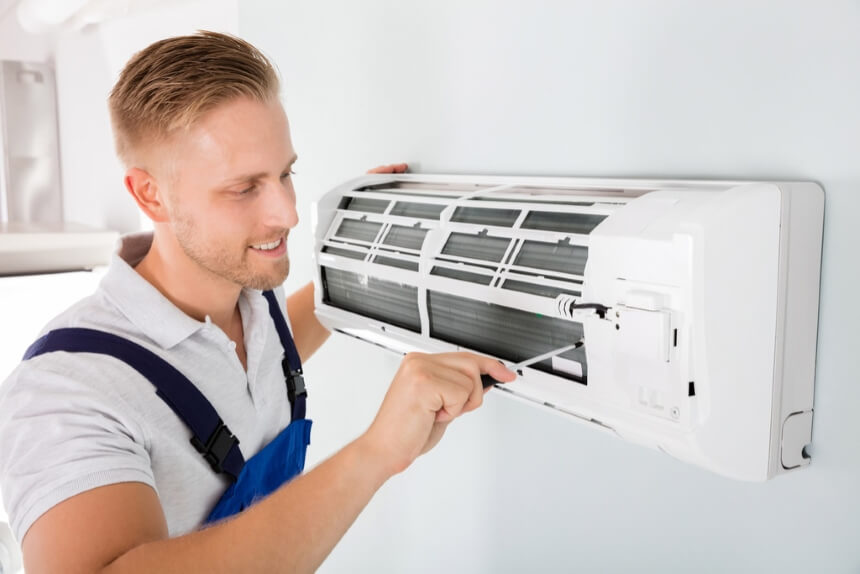
A middle ground may be the split ductless air conditioning unit. While it is wall-mounted, as long as you have the proper wall hooks, then you can do it yourself, although having a second person help is recommended.
Even a window AC unit is easy to install on its own. Many units will even include an installation kit so you can properly seal around the unit so no unwanted hot air is let through.
Unfortunately, large air conditioning units need to be serviced regularly. Your central air unit should be looked at by a professional once a year. Other, smaller units don’t need to be serviced, although you should still inspect them for any deficiencies.
One part of maintenance that a lot of people forget is if your AC unit has a filter in it. Window AC units will often have a filter as the air that travels through is directly from outside, and they are often used in cities.
Filters should be changed every 3 to 6 months, depending on how much pollution is in your area. Check your instruction manual to see what is recommended.
Finally, there may come a time when it is cheaper to simply replace your unit than to have it fixed. Always check your warranty and have any issues fixed before it expires.
Gone are the days when an air conditioner would rattle, using far too much energy to create a bit of cool air. It used to be that air conditioners would produce so much heat from working that they break down, leaving you in an uncomfortable, humid puddle.
Thankfully, new air conditioners are built to much better standards. While there has been a lot of improvement, some still perform better than others. However, there are a few ways to know how energy efficient a unit is.
The first step is to see if it is Energy Star Trusted Source ENERGY STAR | The simple choice for energy efficiency. ENERGY STAR is the simple choice for energy efficiency. For more than 20 years, EPA's ENERGY STAR program has been America's resource for saving energy and protecting the environment. www.energystar.gov certified. This government program rates appliances and will tell you how efficient they are.
Another specific step is to check the EER. This is a ratio that measures energy efficiency. Look for the number of BTUs (British Thermal Units) the unit produces, as well as the power input, which is expressed in watts. If you have a high EER, then your AC unit is more efficient.
The more energy efficient an air conditioner is, the less heat it takes to work, the longer it will last, and the lower your electrical bill will be.
Finding the best type of air conditioning for your home can be a bit daunting. There are a lot of choices and they fit all manner of budget of needs. At the end of the day, you want a unit that will keep you comfortable and cool so you can feel truly at peace in your own home. Hopefully, you understand the types of air conditioners that are available so you can find a unit that works best for you. With a little bit of research, this summer will be your best yet.
